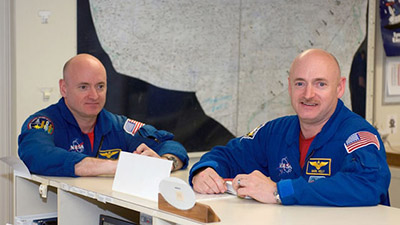
Scientists to study first American to spend a year in space and his identical twin on Earth
As NASA astronaut Scott Kelly launches for the International Space Station Friday, March 27, Northwestern University scientists will be watching with more than a passing interest. Scott Kelly is half of their experiment.
A Northwestern-led research team is one of 10 NASA-funded groups across the country studying identical twins Scott and Mark Kelly to learn how living in space for a long period of time – such as a mission to Mars – affects the human body. While Scott spends a year in space, his brother, Mark, also a veteran NASA astronaut, will remain on Earth, as a ground-based control.
The launch of the Soyuz spacecraft from Kazakhstan will be live-streamed via NASA Public TV. Blast off is scheduled for 2:42 p.m. Central Time.
“What we really want to know is what is going to happen to the human body with prolonged time in space and after a return to Earth?” said Fred Turek, PhD, professor in the Ken and Ruth Davee Department of Neurology, and in Psychiatry and Behavioral Sciences, who is leading the study of how the space environment affects the microbiota “ecosystem” in the human gastrointestinal (GI) tract.
Turek is also the Charles E. and Emma H. Morrison Professor of Biology in the Weinberg College of Arts and Sciences and director of the Center for Sleep and Circadian Biology at Northwestern. His research team includes Northwestern colleague Martha Vitaterna, PhD, and collaborators from Rush University Medical School and the University of Illinois Chicago.
The same interdisciplinary research team also is planning a parallel study in mice. NASA recently selected Turek’s team as one of 16 new life science projects to be carried out onboard the International Space Station at a future time.
Using biological samples collected from the Kelly brothers before, during and after Scott Kelly’s year in space, the researchers will use DNA sequences to identify the microbes inhabiting the gastrointestinal tracts of the twin astronauts.
The study is one of the first to examine how living at zero gravity for a year affects a human’s gut microbiota. The findings will help scientists better understand the role of microbiota in human health and disease.
“Identical twins provide unique advantages,” Vitaterna said. “We can directly compare the space twin with the Earth twin because they are a genetic match. Fred and I are thrilled to be part of this unprecedented research.”
The complex ecological microbiology community that inhabits the human GI tract influences normal physiology and behavior and susceptibility to disease. Despite the clear importance of the GI microbiota for maintaining overall health and influencing disease state, the effects of the spaceflight environment on the human microbiome remains unknown.
“It is imperative that studies be carried out on long-term missions in space so that any adverse changes can be identified and countermeasures can be developed to insure the safety and health of our astronauts on extended spaceflight missions, such as to Mars,” Turek said.
In the mouse study, the researchers will study genetically identical mice in space and on Earth. They will examine the effects of long-term spaceflight on hundreds of different microbes in the animals’ gastrointestinal tract as well as the impact of any microbiota changes on physiology and behavior. Ground-based experiments will complement those carried out onboard the International Space Station.
This study will allow the researchers to look at physiological systems they are not investigating in the study of the Kelly twins.
“The results of these studies are going to give us some surprises but ultimately they will teach us how to keep a healthy microbiota and, therefore, a healthy human,” Vitaterna said. She is director of Northwestern’s Sleep, Circadian and Other Rhythm Experiments (SCORE) Core research facility and a faculty member in Weinberg’s department of neurobiology.
Completing the research team are Chicago-area colleagues Ali Keshavarzian, MD, and Christopher Forsyth, PhD, of Rush University Medical School and Stefan Green, PhD, of the University of Illinois Chicago. This team previously published findings on the effects of “jet lag” on microbiota in mice.






